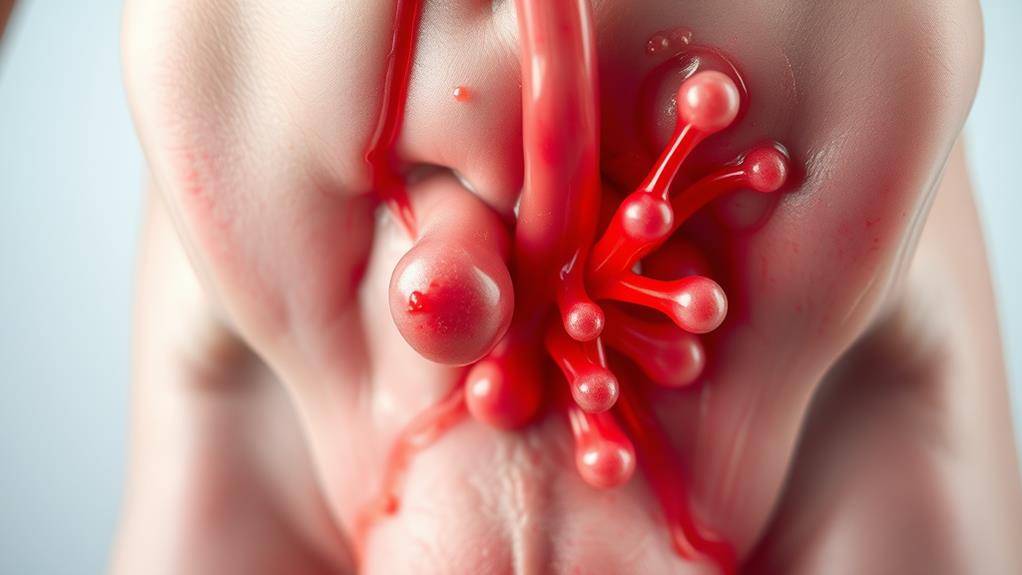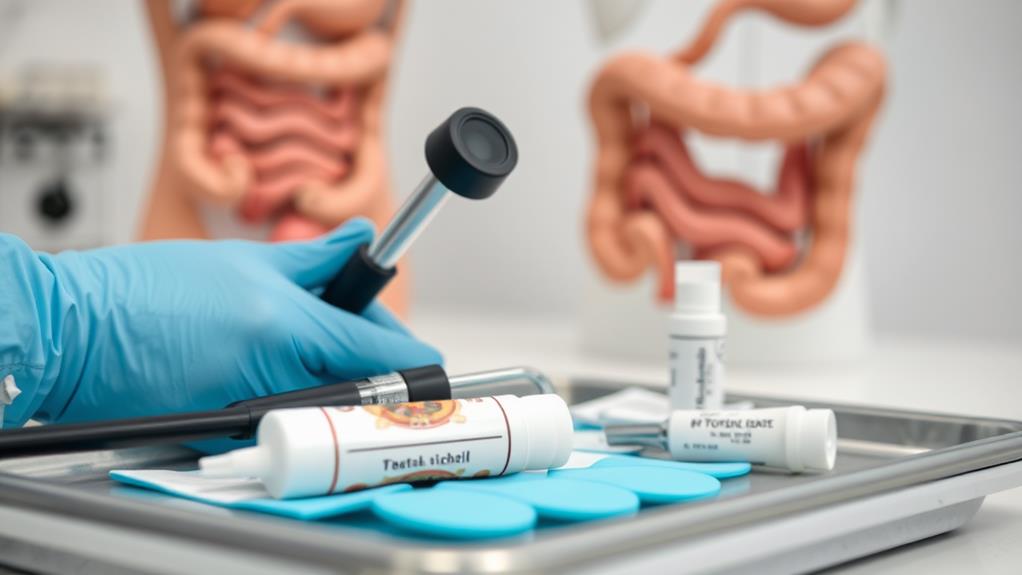As an Amazon Associate I earn from qualifying purchases.
Hemorrhoid recurrence often stems from persistent factors like straining during bowel movements, inadequate fiber intake, and prolonged sitting. To prevent recurrence, you should adopt a high-fiber diet, stay hydrated, and engage in regular physical activity. Proper toilet habits, including avoiding excessive time on the toilet and using a footstool, can also help. Medical interventions like rubber band ligation or sclerotherapy may be necessary for severe cases. Long-term management involves making significant lifestyle changes, regular check-ups with your doctor, and maintaining good hygiene. By understanding the causes and implementing preventive measures, you'll be better equipped to manage this common condition effectively.
Understanding Hemorrhoid Recurrence

Recurrence is a common concern for those who've experienced hemorrhoids. Understanding why hemorrhoids come back can help you take steps to prevent future flare-ups. Hemorrhoid recurrence often results from persistent factors that put pressure on the veins in your rectum. Straining during bowel movements, chronic constipation, or diarrhea can all contribute to this pressure, increasing your risk of recurrence.
To reduce your chances of hemorrhoid recurrence, it's vital to address these underlying causes. Increasing your fiber intake and staying well-hydrated can promote regular, soft bowel movements, reducing the need for straining. However, if permanent tissue damage has occurred, you may be more susceptible to future episodes even with proper care.
While hemorrhoids can be defeated with appropriate treatment and lifestyle changes, it's important to remain vigilant. Symptoms may return if you don't maintain healthy habits. If you're concerned about recurrence, consulting a colorectal specialist can provide personalized guidance on managing your condition. They can help you develop a tailored plan to prevent future flare-ups and minimize your risk of experiencing hemorrhoid symptoms again.
Common Causes of Recurring Hemorrhoids
While understanding recurrence is important, it's equally valuable to identify the specific factors that lead to repeated hemorrhoid flare-ups. Chronic constipation is a primary hemorrhoids cause, as it increases pressure on the rectal area, leading to swollen veins. Straining during bowel movements exacerbates this issue, potentially causing rectal bleeding and persistent pain and discomfort.
Your lifestyle choices play a vital role in hemorrhoid recurrence. Inadequate fiber intake can contribute to constipation, while prolonged sitting or standing increases pressure on the anal area. Obesity and pregnancy also put extra strain on these sensitive tissues. Neglecting proper hygiene or using harsh toilet paper can irritate existing hemorrhoids, making them more prone to flare-ups.
To help prevent recurrence, focus on lifestyle changes. Increase your fiber intake, stay hydrated, and exercise regularly to promote healthy bowel movements. Avoid straining and limit time spent on the toilet. If you experience persistent symptoms, consult a healthcare professional for a physical exam. They may recommend additional treatments or preventive measures tailored to your specific situation, ensuring long-term relief from recurring hemorrhoids.
Lifestyle Factors and Hemorrhoids

Maintaining a healthy lifestyle plays a crucial role in preventing and managing hemorrhoids. Your daily habits can profoundly impact your risk of developing or exacerbating this condition. To prevent hemorrhoids and reduce the likelihood of recurrence, you'll want to focus on several key lifestyle factors.
- Diet: Adopting a high-fiber diet can help prevent hard stools, which often lead to straining during bowel movements.
- Exercise: Staying physically active improves circulation and helps maintain a healthy weight, both of which can reduce the risk of hemorrhoids.
- Sitting habits: Avoiding prolonged sitting and using a cushion or donut-shaped pillow can alleviate pressure on the anal area.
- Lifting techniques: Proper form when lifting heavy objects can prevent increased abdominal pressure.
You'll want to be mindful of weight gain, as excess pounds can increase the risk of hemorrhoids. Stay hydrated to keep stools soft and easy to pass. If you're prone to hemorrhoids, consider using a sitz bath after bowel movements to soothe the area. By incorporating these lifestyle changes, you'll be taking proactive steps to manage and prevent hemorrhoid recurrence.
Dietary Changes for Prevention
A significant aspect of preventing hemorrhoid recurrence lies in making smart dietary choices. Eating a high-fiber diet is vital in this effort. You should aim to increase your fiber intake to 25-30 grams per day, which can help normalize your bowel movements and reduce the risk of hemorrhoid recurrence. Include foods such as whole grains, fruits, and vegetables in your meals to soften your stool and minimize straining during bowel movements.
To support your high-fiber diet, drinking plenty of water is imperative – at least 8-10 glasses a day. This helps the fiber work effectively in your digestive system and prevents constipation, a major contributor to hemorrhoid recurrence. Additionally, incorporate fiber-rich foods like legumes, nuts, and seeds into your diet to promote regular bowel movements.
While focusing on what to eat, it's equally important to know what to avoid. Reduce your consumption of foods that are low in fiber and high in fat, sugar, and salt, such as processed and fast foods. By making these dietary changes, you'll notably improve your chances of preventing hemorrhoid recurrence and maintaining better overall digestive health.
Medical Interventions and Treatments

Medical interventions and treatments come into play when lifestyle changes and home remedies don't cut it for managing hemorrhoids. Your doctor may recommend various options depending on the severity of your condition. Here are four common treatments for hemorrhoids:
- Rubber band ligation
- Sclerotherapy
- Hemorrhoidectomy
- Stapled hemorrhoidopexy
Rubber band ligation is a minimally invasive procedure for internal hemorrhoids. It involves placing a small elastic band around the hemorrhoid's base, causing it to shrink and fall off within a week. For smaller internal hemorrhoids, sclerotherapy might be your best bet. This treatment injects a chemical solution into the hemorrhoid, shrinking it by scarring and cutting off its blood supply.
In severe cases that don't respond to other treatments, your doctor may suggest hemorrhoidectomy. This surgical procedure removes the hemorrhoid with a 95% success rate. Another surgical option is stapled hemorrhoidopexy, which treats bleeding or prolapsed internal hemorrhoids by stapling them back into their normal position.
For a non-surgical approach, infrared coagulation uses infrared light to heat and shrink hemorrhoids. This treatment boasts a 70-80% success rate in relieving symptoms and reducing hemorrhoid size.
Long-Term Management Strategies
To manage hemorrhoids long-term, you'll need to make significant lifestyle changes, including dietary adjustments and increased physical activity. Regular check-ups with your doctor can help monitor your condition and adjust treatments as needed. If conservative measures aren't effective, you might need to weigh surgical options, but these should be discussed thoroughly with your healthcare provider.
Lifestyle Modifications
Several lifestyle modifications can substantially reduce the risk of hemorrhoid recurrence, offering long-term management strategies for those prone to this condition. To effectively manage hemorrhoids and prevent their return, you'll need to focus on improving your diet, increasing physical activity, and maintaining healthy habits.
Start by adopting a high-fiber diet rich in fruits, vegetables, and whole grains. This dietary change, combined with drinking at least eight glasses of water daily, will help soften your stool and promote regular bowel movements, reducing straining during defecation. Engage in regular physical activity, such as walking or jogging, to stimulate bowel function and reduce pressure on the veins in your anus and rectum.
To further decrease your risk of hemorrhoid recurrence:
- Avoid prolonged sitting and take regular breaks to stretch and move around
- Lose weight and maintain a healthy weight through diet and exercise
- Practice proper toilet habits, avoiding excessive time on the toilet
- Use a footstool while defecating to reduce straining
Ongoing Medical Supervision
After implementing lifestyle changes, ongoing medical supervision becomes an essential component of long-term hemorrhoid management. Your primary care provider will monitor your medical history and perform regular check-ups to detect and treat recurrent symptoms early. This proactive approach reduces the risk of complications and improves your quality of life.
During follow-up visits, your doctor may conduct a rectal exam or visual examination to assess your condition. In some cases, they might recommend a flexible sigmoidoscopy for a more thorough evaluation. These regular check-ups also allow your healthcare provider to identify underlying causes of recurrence and offer guidance on lifestyle modifications.
| Examination Type | Frequency | Purpose |
|---|---|---|
| Rectal Exam | Annually | Detect abnormalities |
| Visual Inspection | As needed | Assess external hemorrhoids |
| Sigmoidoscopy | Every 3-5 years | Screen for internal issues |
Don't hesitate to seek immediate medical attention if you experience hemorrhoid symptoms like rectal bleeding, pain, or prolapse. Remember, even if you go home feeling better, it's essential to maintain ongoing supervision, especially if symptoms persist or you notice blood in the stool. Your healthcare team may recommend maintenance therapy, such as fiber supplements or stool softeners, to prevent future episodes.
Surgical Intervention Considerations
When conservative treatments fail to manage recurrent hemorrhoids, surgical interventions become necessary long-term management strategies. You'll find several options available, each with its own benefits and considerations. Surgical hemorrhoidectomy is the most invasive procedure but offers a 95% success rate in eliminating symptoms. It requires general anesthesia and a 7-10 day recovery period.
For less invasive alternatives, consider:
- Rubber band ligation, which can be repeated every 6-8 weeks
- Stapled hemorrhoidopexy, using a stapling device for bleeding or prolapsed internal hemorrhoids
- Laser or infrared coagulation, offering minimally invasive treatment
- Sclerotherapy or cryosurgery, performed as office procedures
These options provide varying degrees of effectiveness in managing hemorrhoid recurrence. Your doctor will help you choose the most suitable intervention based on your specific condition and preferences. Remember, while surgical interventions can be highly effective, they're typically reserved for cases where conservative treatments have failed. Crucial to keep in mind is to weigh the benefits of long-term symptom relief against the potential risks and recovery time associated with more invasive procedures. Discuss all available options with your healthcare provider to make an informed decision about your hemorrhoid management strategy.
Frequently Asked Questions
How Do You Stop Hemorrhoids From Coming Back?
To prevent hemorrhoids from returning, you'll need to address common triggers. Avoid prolonged sitting, dietary mistakes, and poor hygiene. Strengthen weakened veins, reduce pressure, and be cautious with anal sex. Limit heavy lifting, exercise regularly, and consider genetic predisposition.
How Can One Prevent Hemorrhoids From Developing a Recurring?
To prevent recurring hemorrhoids, you'll need to make dietary changes, increase fiber intake, and modify your lifestyle. Take sitz baths, exercise regularly, maintain a healthy weight, strengthen your pelvic floor, improve bowel habits, adjust toilet posture, and manage stress effectively.
What to Do if Your Hemorrhoid Keeps Coming Out?
If your hemorrhoid keeps coming out, you're likely experiencing painful episodes and constant discomfort. Consider hemorrhoid surgery to prevent sudden relapses and awkward situations. It'll help you avoid embarrassing moments, unusual bleeding, and frustrating experiences with annoying symptoms.
Why Does the Same Hemorrhoid Keep Coming Back?
You're not out of the woods yet. Your hemorrhoid keeps returning due to prolonged sitting, poor circulation, weak anal sphincter, inadequate fiber, straining habits, genetic predisposition, incomplete healing, chronic diarrhea, and inflammatory response. Address these factors to prevent recurrence.
Conclusion
You've now got the tools to keep those pesky hemorrhoids at bay. Remember, prevention is like tending a garden – it requires consistent care and attention. Just as a neglected garden becomes overrun with weeds, ignoring your lifestyle habits can lead to recurring hemorrhoids. By implementing these dietary changes, staying active, and managing stress, you'll cultivate a healthier environment for your body. Don't hesitate to consult your doctor if symptoms persist – they're your ally in this journey.
Amazon and the Amazon logo are trademarks of Amazon.com, Inc, or its affiliates.
